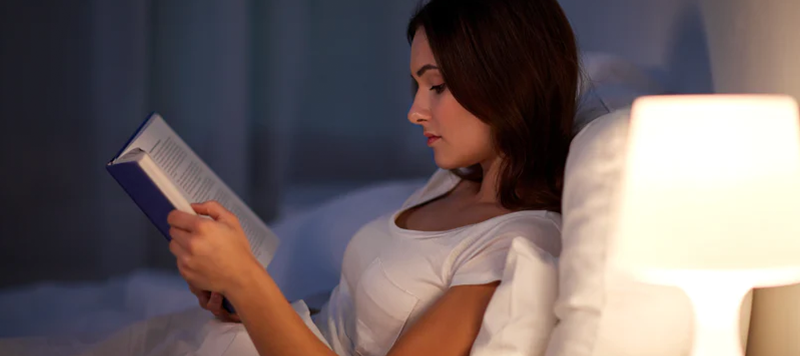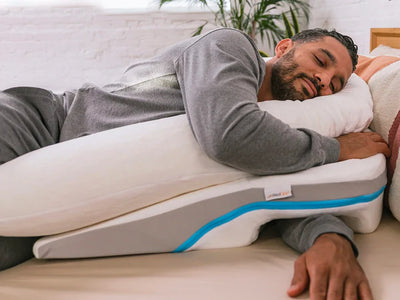
Related Product

Shoulder Relief System
$249.99 USD
Our system has a patented arm pocket that allows your arm to rest comfortably, alleviating pressure on your shoulder and triggering pain.
Establish Healthy Sleep Habits With These 5 Sleep Hygiene Strategies
Share
Bad sleep can harm your long-term health, leading to problems like high blood pressure, diabetes, and mental health issues. But incorporating healthy sleep habits — also known as sleep hygiene — can help optimize your sleep.
However, the sleep hygiene strategies that work for one person might not work for someone else. And while it may require a bit of trial and error to figure out best practices, here are a few tips for establishing healthy habits for better sleep.
Sleep Hygiene Strategy 1: Set a Consistent Sleep-Wake Schedule
A regular sleep-wake schedule will help support your circadian rhythm — the cycle set by your body's internal clock that helps you fall asleep and get up daily. People who don’t have a consistent sleep-wake rhythm will never be able to establish proper sleep patterns and will experience problems similar to jet lag.
Here are a few healthy sleep habit tips to help you establish and maintain a fixed sleep-wake schedule.
- Start slowly - It might be tempting to overhaul your current routine all at once, but this can completely throw off your schedule. Instead, make gradual adjustments by an hour or two.
- Keep weekends the same - Try to wake up at the same time every day, even on the weekends. Limit the difference to about an hour to avoid disrupting your sleep-wake rhythm.
- Keep naps short and sweet - Napping can be a great way to boost energy during the day. But if you nap too long, it can throw off your sleep schedule. Keep naps to no longer than 20 minutes, and try to avoid napping later in the day or close to bedtime.
Sleep Hygiene Strategy 2: Build Bedtime Rituals
Having a bedtime routine reinforces that it's time for sleep in your mind. Try and do the same thing every night, like lighting a candle while brushing your teeth and getting ready for bed. Here are a few other ideas on how to build healthy sleep habits and rituals.
- Unplug your electronics - Recent studies have shown that the blue lights from electronic screens can disrupt your circadian rhythm. Put away your cell phone, laptop, or tablet at least 60 minutes before bed.
- Take time to unwind - Use the time before bed for low-key activities like reading, stretching, and meditating. Tranquil music and calming scents like lavender can also help cultivate a calmer mind.
- Dim the lights - Avoid bright artificial lights as they can hinder melatonin production, which helps the body facilitate sleep.
Sleep Hygiene Strategy 3: Create a Comfortable Sleeping Space
Your bedroom should be a cozy haven where you go every night to relax and reboot: a calming environment free of disruptions to help you get the best sleep. What makes a bedroom inviting will differ for each person, but here are a few suggestions to help you create a sacred sleeping space.
- Invest in a high-quality mattress - The right firmness can affect your sleeping quality. Quality materials will also keep you from sinking in during the night and waking up achy and sore.
- Set a cool but comfortable temperature - Sleep experts recommend creating a cave-like experience that’s cool, dark, and quiet. While you’ll want to set temperatures to your preferences, a temperature around 65 degrees Fahrenheit is advised.
- Block out noise and light - Put up blackout curtains or wear an eye mask to prevent light from disrupting your sleep. For noise, try a white noise machine, fan, or earplugs to drown out bothersome sounds.
Sleep Hygiene Strategy 4: Establish Healthy Daily Habits
It’s not just about evening strategies, though. What you do during the day can affect your quality of sleep. Here are a few tips to help you support your circadian rhythm in the waking hours so that you can rest easy at night.
- Move your body - Exercise can help you get better sleep by releasing endorphins that reduce stress, a major cause of poor sleep quality. Give yourself plenty of time, at least two hours, to complete your workout before bed. Or better yet, schedule your exercise for earlier in the day.
- Limit caffeine and alcohol - Caffeine can give you a quick boost during the day, but it can also make it hard to fall asleep or get quality sleep since it’s a stimulant. Alcohol, on the other hand, can make you sleepy, but once the effect wears off, it can disrupt your sleep. For best practices, drink caffeine and alcohol in moderation and avoid both later in the day.
- Avoid smoking - Nicotine is another stimulant that affects your central nervous system and disrupts your sleep. Since smoking is generally bad for your body and is related to a host of sleep issues, it's best to avoid it altogether.
- Eat a healthy diet - What you eat can significantly impact the quality of your sleep. Fuel your body with fruits, veggies, protein, and healthy carbs to get the vitamins and nutrients you need.
- Don’t eat too late - Sleep experts recommend waiting at least three hours after eating before going to bed to give you enough time to digest the food in your stomach.
Sleep Hygiene Strategy 5: Use Comfortable Bedding
High-quality and cozy bedding can also create a soothing atmosphere and help you find blissful slumber. Pillows and wedges designed to help you sleep comfortably on your side can also ease chronic health issues like arthritis and sleep disorders.
MedCline provides a range of pillows to help relieve physical discomfort that could impact your sleep quality. Our line includes:
- An acid reflux system that soothes nighttime reflux
- A shoulder pain relief system to help you find comfort while you sleep
- A therapeutic body pillow for full-body support
How to Maintain Healthy Sleep Habits
While these recommendations may sound easy in theory, real life can get in the way of setting a solid sleep routine. But try not to get caught up in perfection. According to sleep experts at Harvard, incorporating just a few healthy sleep habits can dramatically improve your sleep quality.
So what are you waiting for? Follow these tips, do what you can, and get the sleep you deserve.
Resources
"A Look at the Body's Natural Time-keeping System." UCLA Health, www.uclahealth.org/medical-services/sleep-disorders/patient-resources/patient-education/circadian-rhythms.
"NIOSH Training for Nurses on Shift Work and Long Work Hours." Centers for Disease Control and Prevention, 31 Mar. 2020, www.cdc.gov/niosh/work-hour-training-for-nurses/longhours/mod7/05.html#.
“Blue Light Has a Dark Side.” Harvard Health Publishing, 7, Jul. 2020, https://www.health.harvard.edu/staying-healthy/blue-light-has-a-dark-side
“Melatonin: What You Need To Know.” National Center for Complementary and Integrative Health, Jul. 2022, https://www.nccih.nih.gov/health/melatonin-what-you-need-to-know
“What’s the Best Temperature for Sleep?” Cleveland Clinic, 16 Nov. 2021, https://health.clevelandclinic.org/what-is-the-ideal-sleeping-temperature-for-my-bedroom
Pacheco, Danielle, and Dr. Nilong Vyas. “Caffeine and Sleep.” Sleep Foundation, 18 May 2023. https://www.sleepfoundation.org/nutrition/caffeine-and-sleep
Pacheco, Danielle, and Dr. Abhinav Singh. “Alcohol and Sleep.” Sleep Foundation, 18 May 2023. https://www.sleepfoundation.org/nutrition/alcohol-and-sleep
“Adopt Good Sleep Habits.” Harvard Medical School. https://healthysleep.med.harvard.edu/need-sleep/what-can-you-do/good-sleep-habits
Related Product

Shoulder Relief System
$249.99 USD
Our system has a patented arm pocket that allows your arm to rest comfortably, alleviating pressure on your shoulder and triggering pain.


